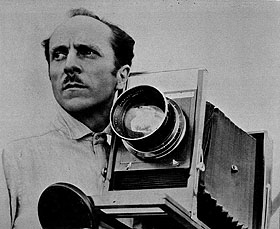Photography to the amateur is recreation, to the professional it is work, and hard work too, no matter how pleasurable it my be.

"Edward Henry Weston" was a 20th-century United States/American photography/photographer. He has been called "one of the most innovative and influential American photographers…" and "one of the masters of 20th century photography." Over the course of his 40 year career Weston photographed an increasingly expansive set of subjects, including landscapes, still lifes, nudes, portraits, genre scenes and even whimsical parodies. It is said that he developed a "quintessentially American, and specially Californian, approach to modern photography" because of his focus on the people and places of the American West. In 1937 Weston was the first photographer to receive a Guggenheim Fellowship, and over the next two years he produced nearly 1,400 negatives using his 8 × 10 view camera. Some of his most famous photographs were taken of the trees and rocks at Point Lobos, California, near where he lived for many years.
Weston was born in Chicago and moved to California when he was 21. He knew he wanted to be a photographer from an early age, and initially his work was typical of the soft focus pictorialism that was popular at the time. Within a few years, however, he abandoned that style and went on to be one of the foremost champions of highly detailed photographic images.
If you enjoy these quotes, be sure to check out other famous photographers! More Edward Weston on Wikipedia.Anything that excites me for any reason, I will photograph; not searching for unusual subject matter, but making the commonplace unusual.
Photography suits the temper of this age -- of active bodies and minds. It is a perfect medium for one whose mind is teeming with ideas, imagery, for a prolific worker who would be slowed down by painting or sculpting, for one who sees quickly and acts decisively, accurately.
My own eyes are no more than scouts on a preliminary search, for the camera's eye may entirely change my idea.
I was extravagant in the matter of cameras Ð anything photographic Ð I had to have the best. But that was to further my work. In most things I have gone along with the plainest Ð or without.
I see no reason for recording the obvious.
There is nothing like a Bach fugue to remove me from a discordant moment... only Bach hold up fresh and strong after repeated playing. I can always return to Bach when the other records weary me.
Now to consult the rules of composition before making a picture is a little like consulting the law of gravitation before going for a walk. Such rules and laws are deduced from the accomplished fact; they are the products of reflection...
Copyright © 2024 Electric Goat Media. All Rights Reserved.